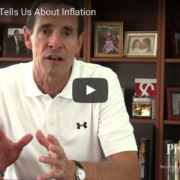How to Stay Ahead of the Investing Curve
Here’s a quiz question: Why did the average investor see a 3.5% return while the U.S. stock markets averaged annual returns of 7.8% over the past 20 years?*
The answer is simple, the average investor bought high and sold low.
Superficially buying high and selling low doesn’t make sense, but the root cause can be explained by emotional investing behavior. Investors tend to buy when times are good and sell when troubles in the market arise. They often don’t get back into the market in time to capture much of the later upturn in stock prices, and as a result are always behind the curve.*
There can also be a tendency to over respond to losses as opposed to gains. For investors confronted with confusion, uncertainty, and financial loss, the natural reaction is to retreat. If an account falls too much in a short period of time, investors can be tempted to panic and either reduce or sell their investments. Of course you do need to keep in mind that no strategy ensures a profit or protects against a loss, but as a result they would not have been be in the market to participate in the rallies that often followed market declines. (*Please keep in mind history is no guarantee of future results.)
This behavior is magnified by a herd mentality. It’s the tendency for individuals to mimic the actions, rational or irrational, of the larger group. I believe this occurs for two reasons:
- First is the pressure of social conformity, a powerful force often encouraged by the media.
- Second is the group-think mentality. It is unlikely the larger group could be wrong. Instead, they might know something the average investor doesn’t.
But overcoming these obstacles could be easy. I think it’s best to:
- Have a financial game plan and refer back to this plan when markets become volatile. Remember, market cycles are a normal part of investing.
- Diversify your portfolio so it’s spread among different asset classes and geographies, including foreign investments.
- Invest regularly, not just when the markets are up and everyone feels good. Investing regularly is also referred to as “Dollar Cost Averaging”.
I think the real reason the average investor underperforms the market is because of their own emotional investing behavior. Too often popular financial magazines and advertisements contribute to this behavior by providing misleading information. Coupled with a tendency to adopt a herd mentality these lead to poor investment decisions such as buying high and selling low. I think the best way to help avoid these mistakes is by developing a plan and sticking to it. From my point of view, a solid diversification strategy and regular investing will take you a long way to becoming a wise investor.
Steve Booren is the Owner and Founder of Prosperion Financial Advisors, located in Greenwood Village, Colo. He is the author of Blind Spots: The Mental Mistakes Investors Make and Intelligent Investing: Your Guide to a Growing Retirement Income and a regular columnist in The Denver Post. He was recently named a Barron’s Top Financial Advisor and recognized as a Forbes Top Wealth Advisor in Colorado.
Sources:
Dalbar QAIB - Quantitative Analysis of Investing Behavior, April, 2012.




